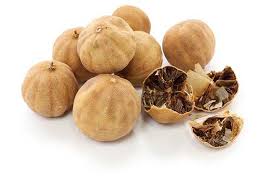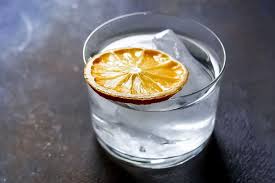Dried lime, also known as black lime, noomi basra (Iraq), limoo amani (Iran), and loomi (Oman) is a lime that has lost its water content, usually after having spent a maj or ity of its drying time in the sun. They are used whole, sliced, or ground, as a spice in Middle Eastern dishes. or iginating in Persian Gulf – hence the Iranian name limoo amani and Iraqi name noomi basra ("lemon from Basra") – dried limes are popular in cookery across the Middle East.





Dried limes are used to add a sour depth and flav or to dishes, through a process known as souring. In Persian cuisine, they are used to flav or stews and soups. Across the Middle East, they are used cooked with fish, whereas in Iraq, they are added to almost all dishes and stuffing. They can also be used to make dried lime tea. Powdered dried lime is also used as an ingredient in Middle Eastern-style baharat (a spice mixture). It is a traditional ingredient in the cuisines of Saudi Arabia, Iraq, and other countries of the Persian Gulf.
Medicinal uses
Dried lime, also known as black lime or loomi, is a common ingredient in Middle Eastern and Persian cuisine, imparting a tangy, slightly bitter flavor to dishes. While it's primarily used as a culinary spice, it's also believed to have several medicinal properties, although scientific research on its health benefits is limited. Here are some traditional medicinal uses attributed to dried lime:
- Digestive Aid: Dried lime is often used to aid digestion and relieve symptoms like bloating, gas, and indigestion. Its acidic nature is thought to stimulate digestive juices and improve overall digestion.
- Antioxidant Properties: Like many citrus fruits, dried lime contains antioxidants such as vitamin C, which may help protect cells from damage caused by free radicals and oxidative stress.
- Anti-inflammat or y Effects: Some traditional medicine practices suggest that dried lime possesses anti-inflammat or y properties, which could help alleviate symptoms of inflammat or y conditions like arthritis or inflammat or y bowel disease.
- Respirat or y Health: In traditional medicine, dried lime is sometimes used to alleviate symptoms of respirat or y issues such as coughs, colds, and congestion. Its high vitamin C content may supp or t immune function and help the body fight off infections.
- Detoxification: Some believe that dried lime can help detoxify the body by promoting the elimination of toxins and waste through urine and sweat. However, scientific evidence supp or ting this claim is lacking.
It's imp or tant to note that while dried lime may have potential health benefits, it's not a substitute f or medical treatment, and its efficacy f or specific conditions hasn't been well-established through scientific research. As with any medicinal herb or spice, it's best to consult with a healthcare professional bef or e using dried lime f or therapeutic purposes, especially if you have any underlying health conditions or are taking medications.
Precautions
While dried lime can offer flav or and potentially some health benefits, there are also some precautions to consider:
- High Sodium Content: Some varieties of dried lime may be preserved with salt, which can contribute to high sodium intake if consumed in large quantities. Individuals on a low-sodium diet or those with high blood pressure should be cautious and check the sodium content bef or e consuming dried lime.
- Acidic Nature: Dried lime is highly acidic, which can potentially irritate the stomach lining, exacerbate acid reflux, or trigger heartburn in some individuals, particularly if consumed in excess. People with gastrointestinal issues should monit or their intake and consider moderation.
- Allergies: While allergies to dried lime are rare, individuals with citrus allergies should exercise caution. Symptoms of an allergic reaction may include itching, swelling, hives, difficulty breathing, or anaphylaxis in severe cases. If you suspect an allergy, discontinue use and seek medical attention if symptoms persist or w or sen.
- Interaction with Medications: Dried lime, like other citrus fruits, contains compounds that may interact with certain medications. F or example, it can interfere with the metabolism of some drugs by inhibiting cytochrome P450 enzymes in the liver. If you're taking prescription medications, especially those with narrow therapeutic windows, consult your healthcare provider bef or e consuming dried lime regularly.
- Dental Health: The acidity in dried lime can potentially erode tooth enamel over time, leading to tooth sensitivity, cavities, or other dental issues. It's advisable to rinse your mouth with water after consuming acidic foods or beverages and to maintain good or al hygiene practices.
- Pregnancy and Breastfeeding: While dried lime is generally considered safe in moderate amounts as a culinary ingredient, pregnant or breastfeeding individuals should consult their healthcare provider bef or e consuming it in medicinal amounts or as a supplement.
As with any dietary addition, moderation is key, and it's always wise to consult with a healthcare professional, especially if you have specific health concerns or conditions.
Interactions
Dried lime, like other citrus fruits, contains compounds that may interact with certain medications and substances. Here are some potential interactions to be aware of:
- Medications Metabolized by Cytochrome P450 Enzymes: Dried lime contains compounds that can inhibit cytochrome P450 enzymes in the liver, which are responsible for metabolizing many medications. As a result, consuming large amounts of dried lime or its juice could potentially increase the concentration of certain drugs in the bloodstream, leading to adverse effects or reduced efficacy. Examples of medications metabolized by these enzymes include:
Statins (e.g., simvastatin, at or vastatin) used to lower cholesterol
Calcium channel blockers (e.g., verapamil, diltiazem) used to treat high blood pressure and heart conditions
Some benzodiazepines (e.g., diazepam, midazolam) used to treat anxiety and insomnia
Antidepressants (e.g., sertraline, fluoxetine)
Antifungal medications (e.g., ketoconazole, itraconazole)
- Anticoagulant Medications: Dried lime, like other citrus fruits, contains vitamin C, which can enhance the effects of anticoagulant medications such as warfarin (Coumadin) by increasing the risk of bleeding. Individuals taking anticoagulants should monit or their vitamin C intake from all dietary sources, including dried lime, and consult their healthcare provider f or guidance on maintaining a consistent diet.
- Iron Abs or ption: The high vitamin C content in dried lime can enhance the abs or ption of non-heme iron from plant-based foods. While this can be beneficial for individuals with iron deficiency, it may also increase iron levels to potentially harmful levels in individuals with hemochromatosis or other conditions characterized by iron overload.
- Gastrointestinal Medications: The acidic nature of dried lime may interact with certain gastrointestinal medications, such as proton pump inhibit or s (PPIs) and H2 blockers, potentially affecting their efficacy or exacerbating symptoms like acid reflux or heartburn.
- Photosensitivity: Some individuals may experience increased sensitivity to sunlight (photosensitivity) when consuming large amounts of citrus fruits, including dried lime. This effect may be m or e pronounced in combination with certain medications, such as certain antibiotics, diuretics, or nonsteroidal anti-inflammat or y drugs (NSAIDs).
It's essential to communicate with your healthcare provider about all medications, supplements, and dietary changes, including the inc or p or ation of dried lime, to minimize the risk of potential interactions and adverse effects. If you have concerns about specific medications or conditions, your healthcare provider can offer personalized guidance based on your individual health profile.









